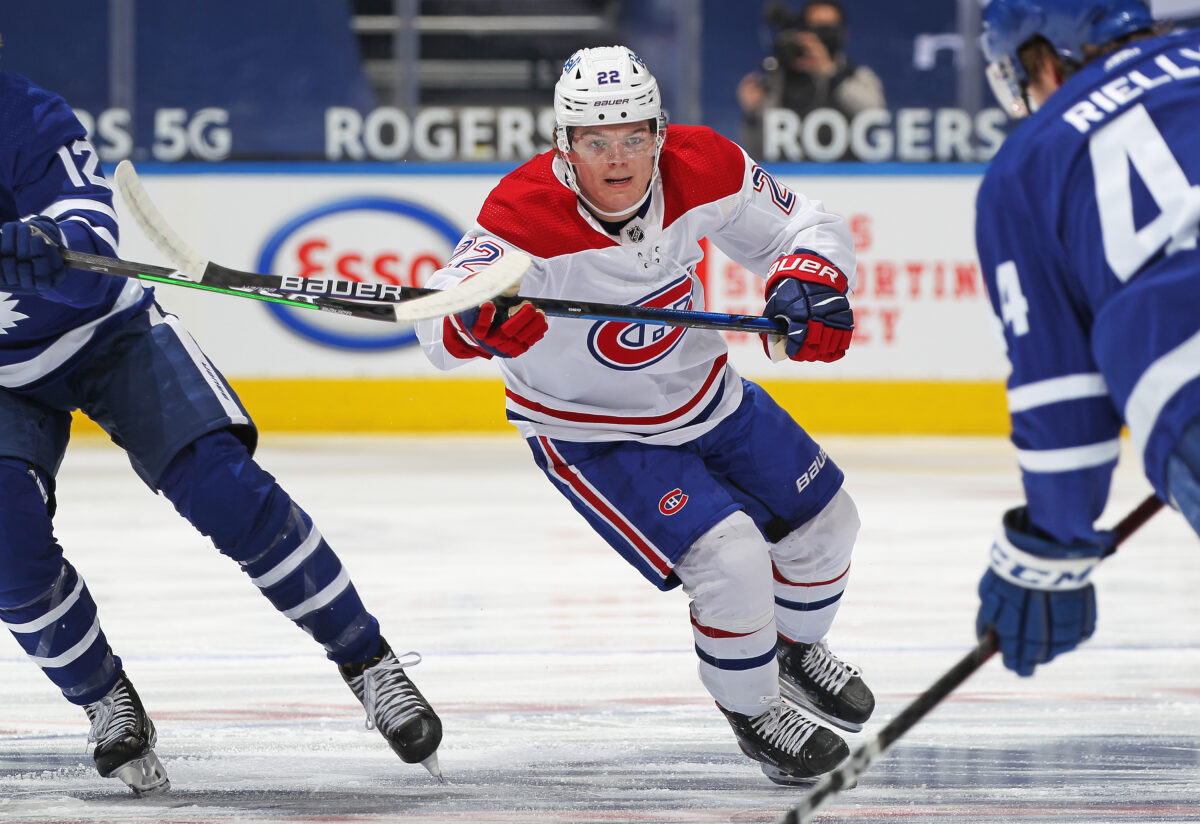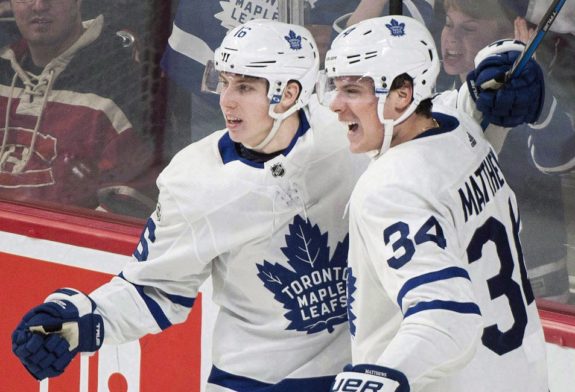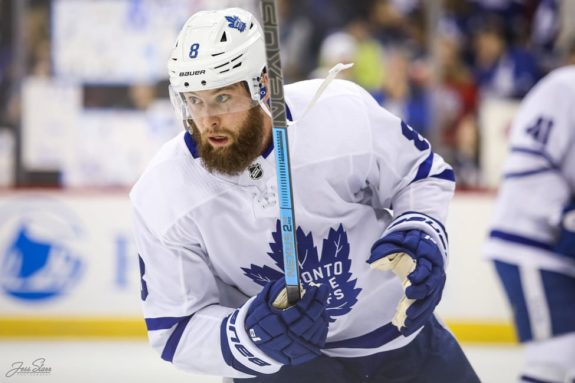For the fifth year in a row with this core, the Toronto Maple Leafs failed to get it done when it mattered.
And, honestly, as much as we all love to joke about how this was always going to be the outcome given the Leafs’ track record in Game 7s, I’m honestly shocked that they failed to pull it off this year. This was, by far, the best chance this team had at crushing the narrative and breaking the curse. And, as the same old song and dance go, they didn’t get the job done.
Even with a good-looking defense for the first time since the mid-2000s. Even with a goalie who was literally breaking NHL records heading into the postseason. Even with a new element of grit in the lineup. Even though they escaped having to deal with Boston or Tampa Bay during the regular season and finished with a record of 35-14-7. They still, somehow, found a way to blow it.
They Really Did it This Time
I’ll bet this part is just as painful for me to write as it is for you to read. But it has to be addressed. Make no mistake; this was the most embarrassing, pathetic choke job we’ve ever seen from this franchise. Even more so than the infamous collapse to Boston in 2013. Yes, blowing a 4-1 lead with ten minutes left in Game 7 will always sting for fans. But this year was just a more painful, longer drawn-out choke.
If you include overtime losses, Montreal finished four games below .500 during the 2020-21 season. The Leafs had an 18-point lead on them heading into the playoffs. And the Canadiens were rolling with an interim head coach who didn’t even use Jesperi Kotkaniemi or Cole Caufield until Game 3. I never expected the Habs to come out and fold in four games as some did. In fact, I actually expected them to put up a good fight. But, on paper, this series should have been the Leafs’ for the taking.

You don’t trade a first-round pick for a locker room booster like Nick Foligno unless you plan on going the distance. You don’t acquire a guy like David Rittich when you already have a serviceable third goalie in Michael Hutchinson available if you don’t plan on making a meaningful run where having four reliable goaltenders might come to use. You don’t tackle every single area of need in the offseason and cap it off by bringing in a legend on the brink of retirement like Joe Thornton on a one-year contract if you plan on fizzling out after seven games.
Between the players, the coaches, management, the media, and the fans alike, there wasn’t a single soul in the hockey world that didn’t at least expect them to get out of the first round with the moves they made. And then when you combine all of these expectations with the fact that they had not one, not two, but three chances to take the series, there’s really no other way to put it. The Maple Leafs pulled off arguably the most egregious choke job in franchise history.
Absence of Stars Played the Biggest Part
When I look at the way this series transpired, you could nitpick a bunch of little things that led to the series loss. Obviously, losing your captain to injury ten minutes into Game 1 is a big blow. Losing Jake Muzzin in Game 6 didn’t help. The giveaways from Alex Galchenyuk and Travis Dermott in Games 5 and 6, respectively, probably could have been done without.
But, ultimately, it all comes back to the fact that Auston Matthews and Mitch Marner were very, very quiet. Finishing the series with one goal and nine points in seven games between them, it’s not really that they were bad offensively, but the Leafs needed their stars to play better than “not bad.” They needed them to play like stars. And that didn’t happen.

We’ve seen what Matthews and Marner are capable of when they’re at their best. Hell, Matthews won the Maurice “Rocket” Richard Trophy as the NHL’s leader in goals with 41 in 52 games, while Marner led the team in scoring with 67 points in 55 games. They finished fourth and fifth in NHL scoring. But there wasn’t a single game all series where Matthews and Marner made a statement. They were both outscored by Alex Kerfoot. And each game, with Game 7 being the worst of it, they were routinely shut down, deprived of any offense at all.
And for what it’s worth, I think Sheldon Keefe needs to take some of the blame here. He’s only coached the Leafs for just over 100 games, and like Dubas, he’s still working out some of his own kinks and only jumped on board in the more recent years of this terrible stretch. So he’s, like, third or fourth on the list of people to blame for this.
But his inability to shake up his top line arguably cost them Games 5, 6, and 7. And I believe he was putting way too much faith in Marner to quarterback this team and give them a boost. When Marner couldn’t even escape his own mind and figure out his own game, how can you expect him to spark an entire team? And when you factor in that William Nylander was arguably the only player to show up in every game, it really would have been worth giving Nylander a look in some higher-leverage situations.
I understand putting faith in your best players. Mike Babcock never did that during his time as Leafs head coach. But at the same time, if something isn’t working, you need to fix it. Especially during the playoffs, when time isn’t on your side and you only have seven games max to make something happen. And while Keefe has typically been pretty good with tinkering lines, he didn’t do it when the team needed it the most.
Kyle Dubas Is Not to Blame
The Leafs’ general manager always seems to find himself under some sort of criticism regardless of the circumstance. And I know there will be a crowd out there that will point fingers at Dubas. When there’s a situation like this, ultimately, you have to start at the top. While there is some merit to that, it simply isn’t applicable in this situation.
Dubas has taken all sorts of heat from fans, specifically traditional ones, because of his analytical side. The ones that think he sits down at a desk, punches numbers into a calculator all day, and bases all of his moves off of what his calculator tells him.
But in recent years, Dubas has delivered on just about everything the fans have asked for. Fans have been clamouring for upgrades to the defensive core since about the time I started watching hockey, which was around the mid-2000s. He promptly went out, traded for Jake Muzzin, and signed T.J. Brodie and Zach Bogosian.

He saw a core that lacked guys who had true playoff experience, so he signed hometown boys like Jason Spezza and Joe Thornton. Fans wanted grit, so he signed Wayne Simmonds. Fans wanted stability in the goal crease, so he traded for Jack Campbell, who wound up taking the starting goalie job from Frederik Andersen midway through the season.
I’m not saying he’s been perfect. When the team you’re in charge of fails to get it done when the stakes are high and see the same losing result year after year, you’re going to have to shoulder some of the blame. But, ultimately, this has only been his team since 2018, and he can’t do anything about the on-ice product. The players simply didn’t have it when they needed to.
It’s easy to sit back and say he dropped the ball on the Marner negotiations. Obviously, $10.6 million a year doesn’t look good on a guy who hasn’t scored a playoff goal since Game 1 against Boston in 2019. However, the players are the ones who call the shots when the puck drops. And if they don’t want to show up and produce when it matters the most, what can he do about that?
On paper, Dubas gave the Maple Leafs and their fans everything they asked for. Everything from grit, to defense, to leadership. He even contradicted everything fans say about him and brought in some players with poor analytical numbers, such as Thornton, Simmonds, and Galchenyuk, because he knew they could help in other ways. And in the end, they didn’t deliver. That’s not on Dubas.
The Question: Where Do We Go From Here?
This is typically the part of the article when I start laying down the grocery list of things the team needs to improve in order to do better next season. But I mean it when I say that I honestly don’t know what to tell you at this point. What area of the roster would you improve for next year that you didn’t already improve this year?
Latest Maple Leafs Content:
- Time for the Maple Leafs to Move Nick Robertson
- Maple Leafs News & Rumors: Pacioretty, Sullivan, Dubas & Robertson
- Maple Leafs’ 5 Best Wingers of All Time
- Marner Needs to Escape Matthews’ Shadow in Toronto
- Maple Leafs News & Rumors: Minten, Cowan, Robertson & Berube
That’s not to say the Leafs should ice the exact same team next season. They’ll obviously tinker with the roster and maybe re-tool in certain areas. But for the first time in five years under this core of players, I genuinely don’t think there are any glaring holes to adjust on the roster. The idea of trading a core player like Marner was floated around briefly by fans, but based on the exit press conferences from Dubas and Brendan Shanahan, it doesn’t sound like that’s a realistic option.
So if you’re not going to shake up the roster by moving a core player, I’m legitimately out of answers. The one aspect left to address is undoubtedly the mental aspect, but that’s not something that you can fix with a trade or a free agent signing. It’s something you need to implement into the core of the team and the culture surrounding them.
Whether that means hiring a sports psychiatrist or sitting down and addressing the mental ability as a legitimate issue, I have no doubt that this will be the number one topic of conversation within the team heading into the offseason.
Overview
I don’t really know what point I was trying to make with this article. I think I’m just sick of seeing the same result year after year like most fans are. And I really wanted to shed light on the fact that I legitimately don’t have any idea how the Leafs are going to tackle this offseason.
You can look at the fact that Tampa Bay and Washington were pretenders for years before they actually made any noise in the playoffs. But the Leafs have the playoff choke to Montreal and pressure from being the hockey mecca of the world breathing down their necks. And I think I speak for everybody when I say I’m very intrigued to see how this offseason is going to go.